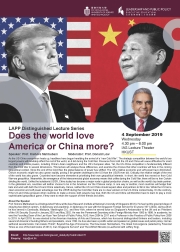As the US-China competition heats up, headlines have begun heralding the arrival of a “new Cold War”. The strategic competition between the world’s two largest powers will inevitably affect the rest of the world, as it did during the Cold War. Pressures from both the US and China will cause difficulties for small countries and middle powers, including China’s Asian neighbours and the US’s European allies. Yet, the US-China competition is fundamentally different from the Cold War in several dimensions. This lecture will analyse these differences, and examine the choices that other countries will face in the coming geopolitical contest.
Since the end of the Cold War, the global balance of power has shifted. The US’s relative economic and soft power have diminished. China’s economic might has also grown rapidly, posing a far greater challenge to the US than the USSR ever did. Critically, the relative weight of the rest of the world has also grown. Countries have become shrewder at prioritising their own geopolitical interests. In short, the world has moved on from Cold War-era geopolitics.
Meanwhile, the emergence of the interconnected global economy means that unlike during the Cold War, there will be no Iron Curtain dividing the world. Unlike the isolationist USSR, China today has become a major node in global production chains, as well as the world’s top trade partner. In the globalized era, countries will neither choose to be in the American nor the Chinese camp. In one way or another, most countries will hedge their bets and work with both the US and China selectively. Hence, neither the US nor China should expect allies and partners to fall in line.
While the US had a clear economic and soft power advantage over the USSR during the Cold War, there are no clear winners in the US-China contest today. On the contrary, if the US and China pressure other countries to make a choice, both powers may lose. Both the US and China will therefore have to learn to play a more sophisticated geopolitical game, if they want to retain the support of their friends and allies.
About the Speaker

Professor Kishore Mahbubani
Professor Kishore Mahbubani is a Distinguished Fellow at the Asia Research Institute at National University of Singapore (NUS).
He has had the great privilege of enjoying two distinct careers, in diplomacy and academia. In diplomacy, he was with the Singapore Foreign Service for 33 years (1971-2004), during which he has served in Cambodia, Malaysia, Washington D.C. and New York, where he served twice as Singapore’s Ambassador to the UN and as President of the UN Security Council in January 2001 and May 2002. He was the Permanent Secretary at the Foreign Ministry from 1993 to 1998.
In academia, he was the Founding Dean of the Lee Kuan Yew School of Public Policy, NUS, from 2004 to 2017 and a Professor in the Practice of Public Policy from 2006 to 2019. In April 2019, he was elected to the American Academy of Arts and Sciences, which has honoured distinguished thinkers and leaders, including several of America’s founding fathers and presidents, since 1780.
He has also been a prolific writer and speaker on global issues and public policy. He has authored several books: Can Asians Think?, Beyond the Age of Innocence, The New Asian Hemisphere, The Great Convergence (selected by Financial Times as one of the best books of 2013), Can Singapore Survive? and The ASEAN Miracle (co-authored with Jeffery Sng).
Related Information

**FREE ADMISSION
Seats are based on a first-enrolled, first-served basis.
Please register on or before 2 September 2019 via the online registration form.
